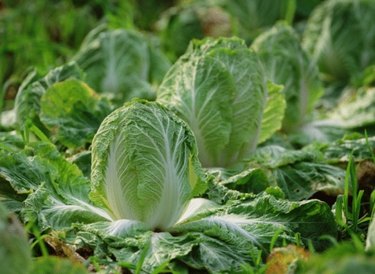
When preparing the soil for your garden, one method you can consider is creating a lasagna, or layered garden. This is a great no-till option for preparing a garden that also creates rich, nutritious soil by sheet composting. You can create this garden with some basic supplies and food waste from your kitchen.
Prepare a Planting Location
Video of the Day
Lasagna, or layer, gardening is a great way to start a new garden bed or to change an existing site to a no-till gardening method. You can also use layering for a raised garden bed. Select a site that has the right conditions for the vegetables you want to grow. Most vegetable crops require full sun. Plan the garden bed so that it is narrow enough that you can reach the entire bed and don't have to walk on it. This can result in compact soil and can have an adverse effect on the growth of your plants.
Video of the Day
While it is not required, you can make a raised bed on the site. This helps provide a clear border for the garden bed and helps to improve drainage. You can purchase raised beds or containers or build your own with planks of wood.
Starting the Garden Bed
You can prepare layered garden beds at any time throughout the year. However, the layers need time to decompose before you plant, so fall is the optimal time to start so that the soil will be ready for spring planting.
Before you start layering, prepare the area. If there is grass growing on the site, mow it as short as your mower will allow. Remove rocks and debris from the area. Lay down cardboard or newspaper as the first layer and then water it down to wet the layer. This will not only help to keep the layer in place but it also provides a moist, dark space where earthworms can thrive.
Garden Soil Layers
The next layer consists of browns. These are composting materials, such as shredded newspaper, peat, leaves and pine needles. Then, follow that with a layer of greens that is about half as thick as your layer of browns. Greens are compost materials, such as grass clippings, and food scraps, such as fruit and vegetable peels, eggshells, tea bags and coffee grounds.
Continue layering browns and greens until the bed is as high as you want it. Keep in mind that the layers will compress over the winter as the material decomposes. The layered soil for gardening should be ready for planting when the weather warms in the spring. If necessary, you can break up and loosen the soil with a garden fork but don't till the soil.
If you want to try layer planting in the spring or summer and are ready to add plants right away, you can do this by adding a final layer of peat or topsoil. If you already have compost ready from another compost pile, you can add that on top of the cardboard or newspaper layer and plant right away.